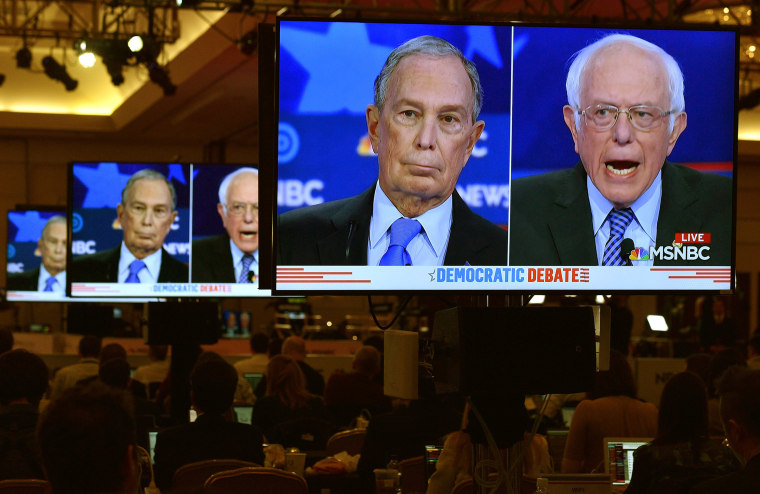LAS VEGAS — Mike Bloomberg came here to consolidate the anti-Bernie Sanders vote, but he may have ended up fracturing it further while reviving the campaign of another progressive rival, Elizabeth Warren, by being her perfect foil.
"Warren soared, Bloomberg stumbled, Sanders skated," said Rob Friedlander, a former top adviser to Beto O'Rourke's campaign. "The door to the nomination is still open for multiple candidates, but without meaningful consolidation of the non-Sanders vote — and fast, with Super Tuesday looming — the delegate math could become inescapable."
If Bloomberg hadn't entered the race, there would be one fewer candidate in the crowded moderate lane of the 2020 Democratic contest and the others might have spent the critical time between Iowa and Super Tuesday, now less than two weeks away, sorting themselves out instead of waiting to see Bloomberg in action.
"The problem is it's now Sanders and everyone else," Democratic consultant Michael Starr Hopkins said. "Everyone else is fighting to be the alternative to Sanders. But as long as you have five or six people splitting up the vote by trying to be the alternative to him, no one is going to be."
Bloomberg isn't going anywhere. And a poor debate showing for him means less than it would for other candidates, because his ads can reach millions who didn't watch the debate and he's at no risk of having his money dry up.
But his lackluster debate performance gave his rivals further resolve to stay in the race.
Pete Buttigieg's campaign suggested in a memo to supporters Thursday that Bloomberg should exit the race or risk handing the nomination to Sanders, turning the tables on Bloomberg, who, just two day earlier, sent his own memo calling on Buttigieg, Amy Klobuchar and Joe Biden to drop out.
"Bloomberg had the worst debate performance in presidential debate history and he showed he can't handle Sanders, let alone Donald Trump," the Buttigieg memo read. "If Bloomberg remains in the race despite showing he can not offer a viable alternative to Bernie Sanders, he will propel Sanders to a seemingly insurmountable delegate lead siphoning votes away from Pete, the current leader in delegates."
Progressives agree with that analysis and are thrilled by it.
"With the moderates unable to consolidate ahead of Super Tuesday, Sanders is poised to garner an insurmountable delegate lead," said Sean McElwee, founder of the left-wing think tank Data for Progress. "Bloomberg has proven to be as unreliable a vehicle for moderates as Biden was."
Warren, meanwhile, who had studiously avoided drawing contrasts with other Democratic candidates, finally found a target she was willing to hit in the real-life billionaire standing onstage next to her.
"Warren ripped Mike Bloomberg's face off on national television," said Charles Chamberlain, chair of Democracy for America, a progressive group that has not yet endorsed anyone.
Warren's return to fighting form after her attempt to portray herself as a unifier, which led to disappointing showings in Iowa and New Hampshire, earned $5 million in fresh donations and a new lease on life.
It may be too late to put Warren back on the fast track to the nomination, but she's now more likely to cross the critical 15 percent threshold needed to secure delegates in coming contests. That would deprive the moderates of delegates who could be critical at a contested Democratic National Convention this summer, which looks increasingly likely.
While Warren and Sanders are seen as competitive for progressive voters, many of their allies have for years foreseen the possibility that they might need to pool delegates at the convention to block a moderate from winning.
"Together, these progressives came in to fight against the billionaires and the candidates billionaires are backing — and won," Chamberlain said.
Klobuchar, Biden and Buttigieg all reported strong fundraising after the debate, and all now have super PACs backing them, as does Warren, which will only give them further support to stay in the race.
Bloomberg and his billions still can't be counted out, however.
Out of practice and late to enter the race, Bloomberg was still lacing up his gloves while the rest of the field was finally taking them off, eight months after they started debating one another.
Download the NBC News app for breaking news and politics
The debates are coming more frequently now. And Bloomberg, who grew into a strong debater over the course of his three New York mayoral campaigns, could come back stronger at next week's debate in South Carolina, just as Barack Obama did after a notoriously poor showing in his first bout with Mitt Romney during his 2012 re-election campaign.
"My suggestion to Mayor Bloomberg would be that he step away from the commercials and land on some of the streets of America and start talking to people who are really affected by the rigged economy," said Lee Saunders, the president of AFSCME, one of the nation's largest labor unions, which has remained neutral.
Nearly 20 million people watched the two-hour NBC News/MSNBC debate, the highest number for any 2020 debate so far.
But even that audience is likely dwarfed by the tens of million Bloomberg is reaching through the 4,106 hours — or 171 days — of ads his campaign is running in 34 states and territories, according to Advertising Analytics.
And Bloomberg has always wanted it to become a two-man race between him and Sanders. Half of the formula fell flat Wednesday, but the other part, Sanders, is now in place.
"Look, the real winner of the debate last night was Donald Trump," Bloomberg said Thursday while campaigning in Utah, a Super Tuesday state. "If we choose a candidate who appeals to a small base, like Senator Sanders, it will be a fatal error."
Ironically, however, because Bloomberg has pledged to keep spending to help whoever wins the Democratic nomination go up against Trump, he could end up spending even more to help put Sanders in the White House if Democrats don't heed his warning.

